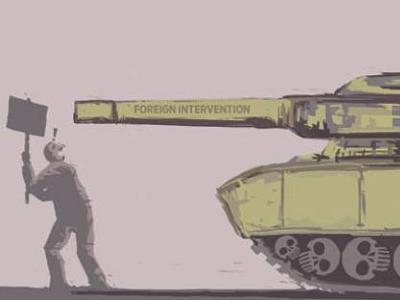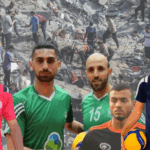Syria’s Fate in Its Citizens’ Hands

Illustration: Nino Jose Heredia/©Gulf News
By Ramzy Baroud, Special to Gulf News
The popular uprising in Syria is hovering over a fine line that separates it from full-blown civil war. If the latter were to happen, it could open the door to other frightening developments, including foreign military intervention.
Protests in Syria began on January 26, and a more inclusive uprising was set in motion on March 15. The initial demand was for serious political reforms, but this was eventually raised to a demand for full regime change, encompassing the unconditional departure of President Bashar Al Assad’s long-ruling Baath party.
For the duration of the entire uprising, the government alleged that armed militias were operating in Syria. While the allegations seemed to be exaggerated — in order to justify the harsh military crackdown — they weren’t entirely unfounded.
"In November alone, the Syrian government has reported at least 108 deaths of soldiers, police and other security forces in attacks by ‘armed terrorist groups’," reported Hannah Allam in the Miami Herald (November 17).
Syrian officials claim more than 1,000 have been killed since the uprising began. But then there is also the matter of the 3,500 Syrians who have been killed at the hands of security forces, according to a recent UN human rights report.
Despite the media blackout instituted by Damascus, mounting evidence showed that excessive force was being applied to largely unarmed civilians. Their demands were not dissimilar to the democratic reforms sought by other Arabs in Tunisia, Egypt and elsewhere.
Writing from Beirut, for the New York Times, Nada Bakri reported of "attacks against the offices of the Syrian ruling Baath party in northwestern Syria … a day after they claimed an assault on an intelligence base". The recent attacks, which seem to be gathering momentum, are "bringing the country closer to civil war" (November 17).
For Syria to be spared the misfortunes of other countries, including Libya, Iraq and Lebanon, several conditions would need to be satisfied. These include: a willingness on the part of Al Assad regime to initiate reforms leading to genuine democracy; a readiness from the opposition to engage the government in unconditional dialogue to bring about such change; and the existence of a genuine and neutral third party to facilitate such a process.
Unfortunately, none of these conditions seem to be at hand. This is allowing the current cycle of violence to morph into a spiralling civil war. It could be argued that the impasse originated in Syria’s own political culture, espoused by the Baath’s legacy of shunning dialogue in times of crisis. More, those who ultimately designated themselves as Syria’s opposition remain largely divided, and often seem to provide conflicting roadmaps for achieving democracy.
But there is more to this than mere failures by the two competing parties. According to Alastair Crooke, a well-regarded analyst on the Middle East, outside powers are determined to weaken Syria and break down the Iran-Syria-Hezbollah alliance.
Political Game
Writing in the Guardian on November 4, Crooke described the way the ‘game’ is played: "set up a hurried transitional council as sole representative of the Syrian people, irrespective of whether it has any real legs inside Syria; feed in armed insurgents from neighbouring states; impose sanctions that will hurt the middle classes; mount a media campaign to denigrate any Syrian efforts at reform; try to instigate divisions within the army and the elite; and ultimately Al Assad will fall — so its initiators insist."
The ‘initiators’ include the US and several EU and Arab countries. As for Israel, which has remained suspiciously silent despite its decade-long campaign to isolate Syria, the possibility of a Syrian civil war was received with a mix of giddiness and caution.
According to the Jerusalem Post, "the Al Assads constitute Israel’s oldest and most implacable adversary on its borders". It was "important, however, to stress the caution with which we might welcome the demise of the Syrian regime" (November 16).
Not included in the alliance to further isolate Damascus, Russia has tried but failed to remain at an equal distance from the conflicting parties. Bluntly describing the new violent developments, Foreign Minister Sergei V. Lavrov said, "this was quite similar to a true civil war," especially as "there are more and more weapons … being smuggled in from neighbouring countries" (Al Jazeera, November 18).
Russia, along with China, vetoed a UN resolution last October condemning the government crackdown on protesters, surely fearing that such a step would pave the way for another Nato-led military intervention.
As in Libya, some hope that the Arab League charts the course of that intervention. In a New York Times editorial on November 8, the role of the Arabs seems to be confined to just that. The Arab League "should eject Syria (as it did on November 12) and urge the United Nations Security Council to condemn Al Assad and impose international sanctions against the regime", counselled the Times. "Russia and China will find it harder to block a Security Council resolution – as they did in October – if the Arab world calls for action that goes beyond the sanctions already imposed by the United States and Europe."
Bizarrely — considering what transpired in Libya — some are now promoting foreign intervention as preventative measure against civil war. In the Miami Herald, Allam suggests that, "without a diplomatic miracle or foreign intervention … Syria is on track for a bloody civil war with the potential for disastrous regional consequences."
And so the saga continues. If the Syrian people don’t wrestle their fate from the hands of the many self-serving forces, the Syrian uprising and Syria as a whole will continue to be marred by uncertainties and foreboding possibilities.
– Ramzy Baroud is an internationally-syndicated columnist and the editor of PalestineChronicle.com. His latest book is My Father Was a Freedom Fighter: Gaza’s Untold Story.










































0 Comments